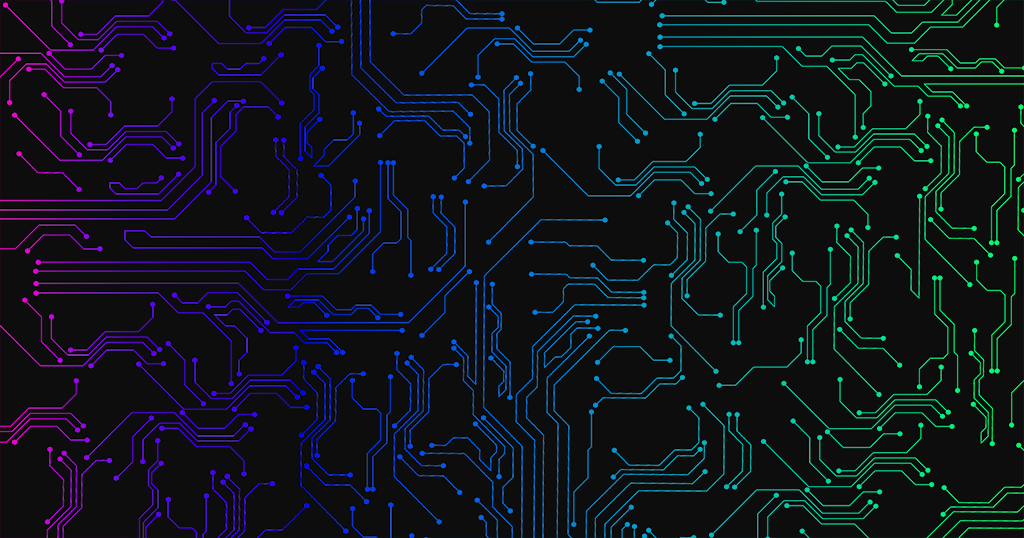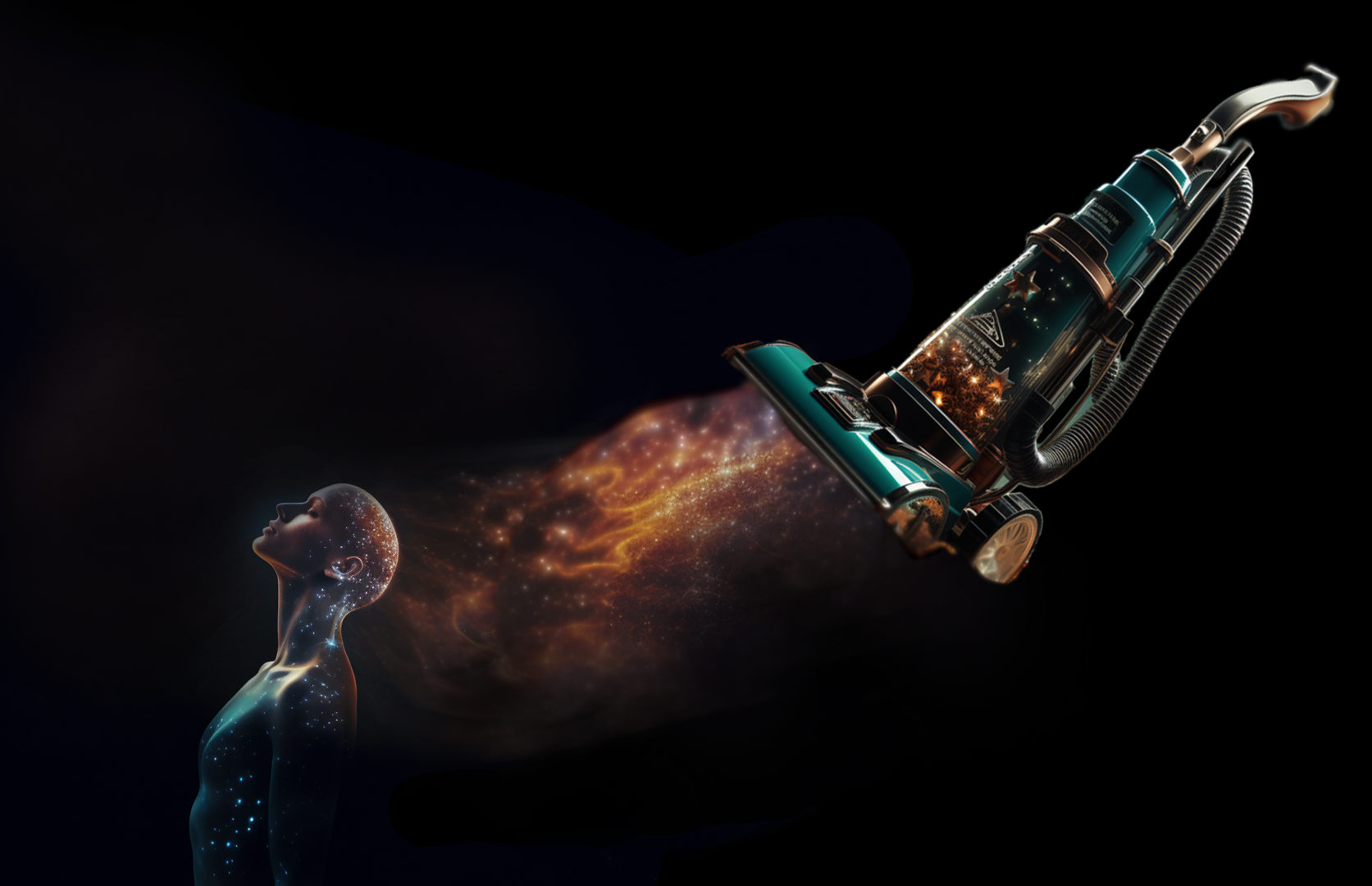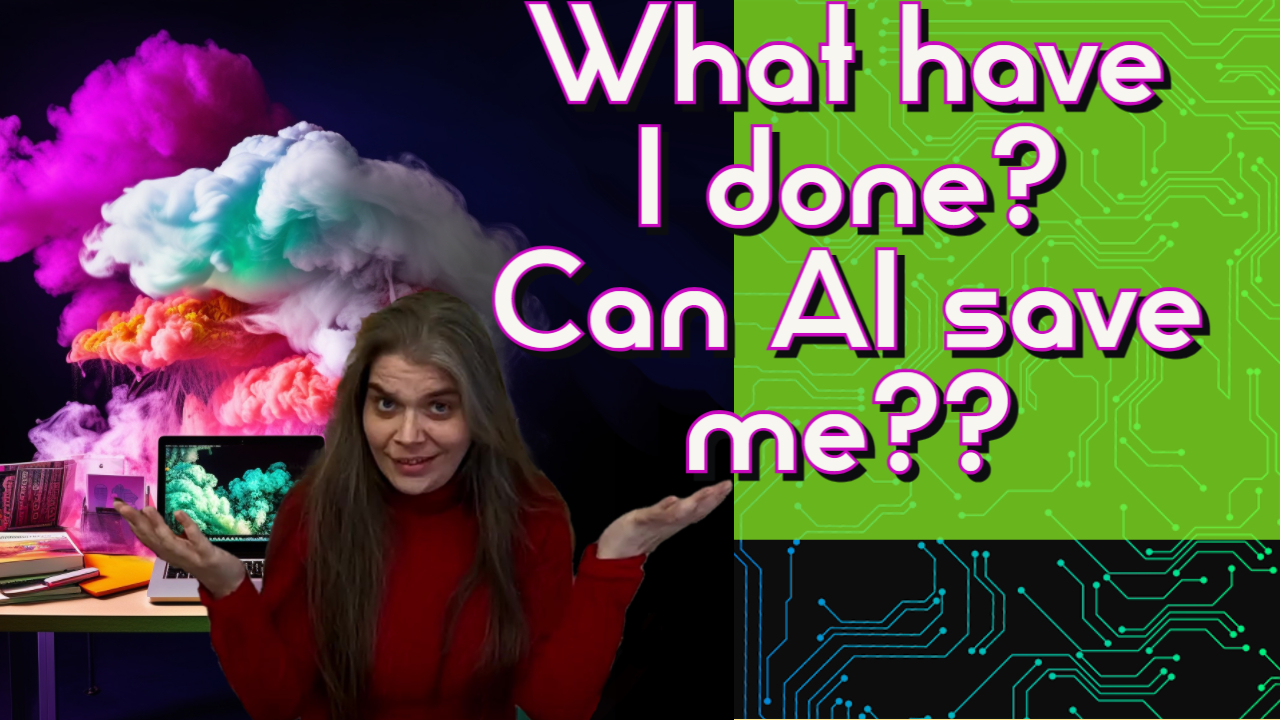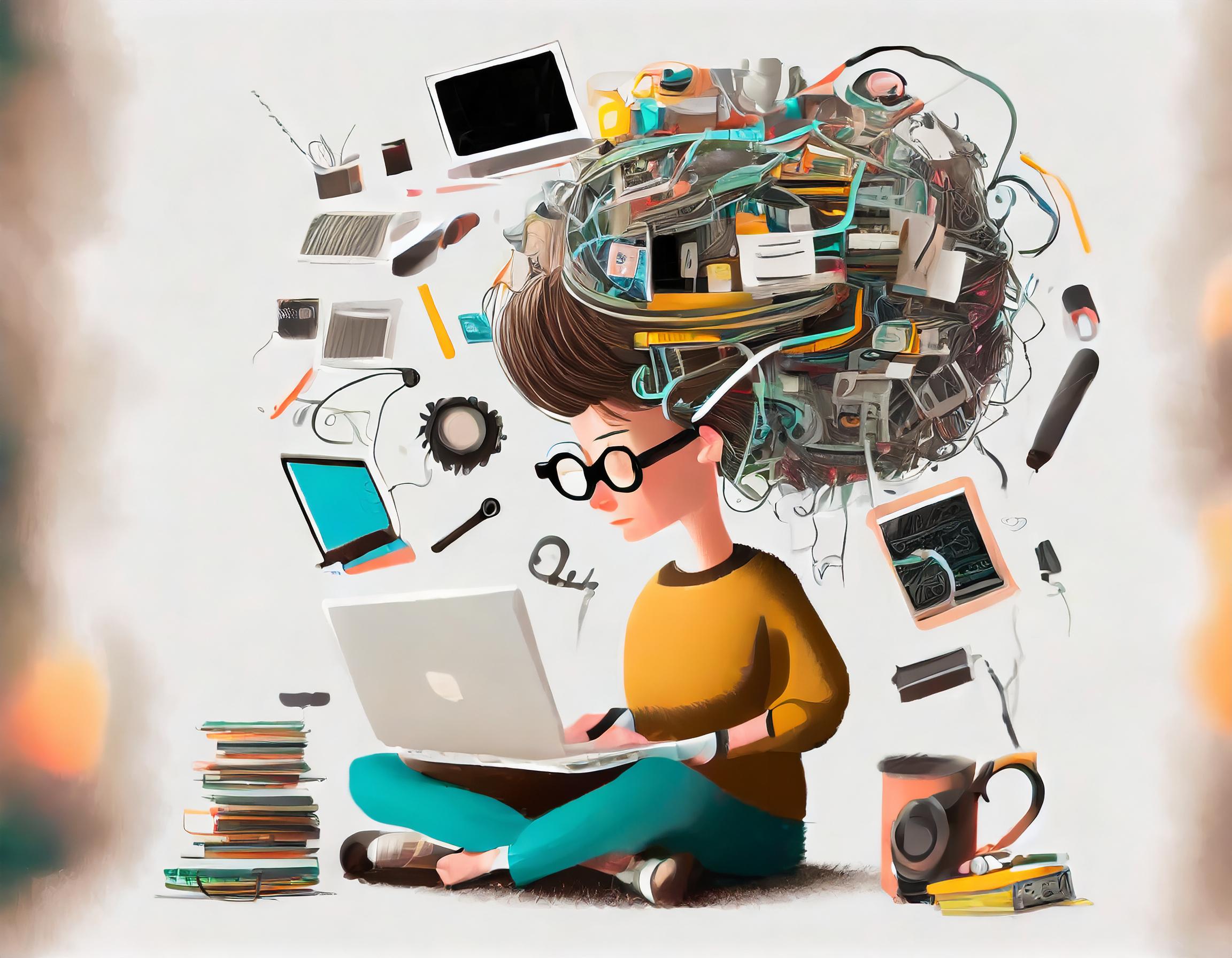After Episode 2 I was ready to dive into some of the popular “AI” courses and training sites I’d been seeing advertised on the other YouTube channels and across the AI Newsletters I’d been reading. As I started to investigate these courses and platforms I realized that first I needed to learn how to learn AI. I had also become concerned that I was moving away from my biggest goal of all; Being a professional singer, songwriter, creating original music and supporting my life through my creative works. I needed a guide or a primer to get started on my AI learning journey. I drilled it down into five keys to success in learning about AI related topics.
- Know your Role
- Know your Goal
- Know Yourself
- Do it Now
- Never Stop Learning
Know Your Role
When it comes to working with AI today, we’re no longer just talking about a world of Data Scientists, Engineers, Researchers and Technology Enthusiasts. Everyone has a place in the AI conversation, as the different capabilities become as integrated into our daily lives as looking at a mobile device, or scrolling through YouTube for our media rather than the cable box. This means that there are many avenues to discuss when it comes to “learning AI”, and it starts with knowing how you want to interact with the technology.
The AI Consumer; Improver
Most of us fall into this first group of AI Consumers, eager to take advantage of chatbots, apps and tools prebuilt to meet our needs. Even the other groups we’ll discuss below will fall into this group, since home computing is limited in what it can do, consumption of AI cloud offerings is common. Chatbots are also fairly ubiquitous to anyone at this point for general web search, advanced research, code review and generation purposes.
In addition to using these tools, we play an important role in improving and furthering the usage of these tools through requesting enhancements. Never miss an opportunity to offer feedback on chatbot responses, AI apps and tools! If you don’t ask for something to be corrected or improved who will? The popular large language models underneath thousands of AI tools were, in general, programmed by a common group of Data Scientists, Software Engineers and Product Managers. No one should be surprised that they don’t really represent an unbiased view, according to The Data Incubator;
“However, the field is still very male-dominated. In the United States, women make up just 18 percent of data science jobs. The numbers are even lower for transgender, non-binary and non-conforming data scientists.”1
The Data Incubator
There is also an excellent deep dive into exploring bias in OpenAI’s GPT-4 and Anthropic’s Claude from Yennie Jun .
It always takes persistence to make lasting change; as a woman who spent her career in IT, I can tell you; we have a long road ahead. The AI Consumer today is sifting through a huge pile of half-baked options that will meet many needs but also fall terribly short in surprisingly simple ways. Let’s not forget that ChatGPT is actually getting worse at math and other topics! 2 The process for locating the correct AI tool and knowing if the tool is producing correct responses or results can be time consuming which I personally learned in my planning portion of Episode 2. Even once a tool is chosen, you may learn, like I did with Rocky.AI; it is just not what I was looking for at all.
Lean on the Experts
For the typical AI Consumer, we need to lean on experts to guide us in the AI journey. I’m not yet ready to say I’m in this category, but maybe after this learning journey I will be! Right now I rely on the following:
Many of these have overlapping stories in their weekly newsletters, but that’s OK, that means I’m verifying the information across multiple platforms. Just like any information, you can never trust one source.
As an AI Consumer, I would suggest to everyone taking some time at learnprompting.org. The concepts covered will improve your interaction with generative chat tools and understand the naming conventions ubiquitous to many AI tools. I’ll be reviewing this training and more in the next segment focusing on the best learning for AI Consumers.
The AI Enhancer
Moving onward in the AI learning journey, AI Enhancers, or Modifiers are those looking to take the work already out there and build upon it. This could mean taking one of the popular repositories on GitHub and forking a branch of your own to make an improvement or taking an existing model and training it on your own specific data. Going from the backseat AI Consumer, just along for the ride (and backseat driving to make improvements) to being in the front passenger seat, assisting with navigation and maybe even taking the wheel for a moment! To be an AI Enhancer you aren’t required to know how to read and write code, but you can’t be afraid of it either. Many of these AI models and tools are considered open source; but be careful to understand the nuances if you’re looking to monetize or redistribute what you enhance; not all licenses are entirely permissive. I’ll be discussing the topic of licensing in an upcoming post and Episode! We’ll go over more tips below, but the Enhancer/Modifier needs to remember to always research what’s already out there before falling down a rabbit hole someone else has already filled in. The same holds true for the final role: The AI Creators.
AI Creators
Have a background in Data Science, Programming, or Engineering? Chances are you’re looking to get into the world of AI in some meaningful way. Most technology professionals are abandoning their existing roles in a mass exodus to get a seat in the musical chair game that has become the technology centered career. How I remember the days when I could just say I was “in IT” and no one knew enough to ask, what I did. You can even read my blog about it.
Now, there are so many niche roles, I have trouble knowing where I’d even land if I chose to move back into the workforce, though I have an upcoming article I’ll be sharing about that too! Just being a Data Scientist or Research Engineer doesn’t mean you’re working with Artificial Intelligence, but I imagine you’d want to be. Just like any technology as more AI tools roll out, everyone working with technology will have to adapt to survive. The skills for AI Creators vary based on the goals as I’ll discuss below, but these are going to be the most advanced skill sets. Understanding multiple coding languages, development practices, security concepts and the overall landscape of the field are critical for AI Creators. While I prefer to be an agnostic when it comes to platforms and languages, this is an area you may want to be master of one rather than a “jane of all trades”. Focusing on specific platforms or models in this case may provide better outcome, but it can be time consuming to determine where you want to start. Working with what you’re most comfortable with already will save you time, effort and likely money. If you already use AWS for other development purposes, jumping over to Azure for AI would probably cause delay and means you have multiple accounts to manage. Whether you’re building off an existing Hugging Face Space or Google Colab Notebook, always take into consideration if the platform just won’t support what you want to do or if it will end up being too costly or unsupportable long term. Creators have additional learning curves around distribution, support and perhaps monetization, that the Enhancer is unlikely to run into and we’ll dive into more detail in the final part of this mini-series on AI learning.
Know Your Goal
Most of us are already familiar with the concept of setting SMART Goals (Specific, Measurable, Achievable, Relevant, and Time-Bound), and AI learning can benefit from this process as well. Let’s walk through this process with my first goal, generating music tracks for my written lyrics and melodies; with AI.
The outcome I’m specifically seeking is the ability to generate drum, bass, rhythm, lead guitar and keyboard tracks for an existing song idea. I have already written the lyrics and can sing the lead and backup vocal parts of the song. I’ll be able to measure the success by the completion of each part of the track starting with the drum track. I also don’t have a lot of money to work with, so I’d like to start by using AI tools without cost if there are any that will meet my needs.
Determining what is truly “achievable” with AI can be challenging, but a little research upfront can save hours of time falling down the wrong path. I had to make a subgoal of; research the currently available free AI tools to determine if there is a tool that will allow me to upload my existing songs and have the AI tool generate the backing instrumental tracks, to keep it time bound was a little bit of an afterthought but overall I spent about 4 hours on this research, a bit more than desired. Sadly, I came up short on a real tool here and I think that audio generation with AI still needs more time to grow into what I’d need. Also, the legal implications are still very concerning. Check out the article I wrote on my research, and the topic of AI music generation isn’t over yet, if there truly is no tool to meet this need, then I may have to take on the AI Creator role myself.
Now for an achievable AI learning goal, use AI for the learning! Using AI as a learning guide and teacher is a great use of AI generative chat for the AI Consumer role since everyone has to continually learn new things! Generative Chat tools like ChatGPT and Claude are actually very good at breaking down what topics you need to learn to get to a goal:
For Example:
I am a Singer, Songwriter that currently cannot play any instruments but I write lyrics and can sing the melody to the songs I write. I can hear the music I want to make in my mind but I haven’t yet developed the skills to create the instrumental tracks to complete my songs. I need you to create a Personalized Learning Path to guide me in learning the skills I need to complete my songs. I will be working with a Windows PC, running Ableton Live Lite 11. I’ll need to learn to work with a Roland JUNO-DS88 Synthesizer and any other tools you suggest including other AI tools and platforms. Is this something you can help me with?
Prompt
Both provided me with detailed, slightly different paths to follow, both of which started with learning Music Theory. From here you can ask for a few different things; Claude offered YouTube links to videos to support each topic, however all the links were invalid and the “free” training offerings were not actually “free”; instead ask the AI to teach you.
Use a prompt such as; “Can you provide me a detailed lesson on Notes, staff, clefs, rhythm written as if I was a middle school student?”
Prompt
Claude and ChatGPT generated basically the same information, but ChatGPT provided an Activity and Homework as part of the Lesson.
These are general concepts though, how will they do with teaching me the specifics of using my DAW or the Synthesizer?
Provide me a detailed learning plan for mastering music production Ableton Live Lite 11, include as much detail as possible including estimated time frames. Then I broke out the first topic that came out of the plan: Please provide me a detailed lesson on “the Arrangement and Session Views, both crucial to Ableton’s workflow. Understand how audio and MIDI clips work in the Session View.”
Prompt
Again, I was more impressed with ChatGPT as it came through as a true teacher, not just providing me bullet lists of answers like Claude. This got me curious about Bard, who landed somewhere near Claude. ChatGPT (3.5 because I have not tried with Pro yet) seems to be the most effective teacher. I was able to follow the instruction provided in the first Activity provided very easily and felt like I actually learned something new in the interface that I already had a basic understanding of.
From here I’ll be able to make specific learning goals for each topic that comes along, and I’ll be able to ask my AI teacher questions as I go along the way.
I’m more skeptical about the training specific to the Synthesizer, let’s take a look at: Please provide me with a detailed Learning Plan for mastering music production and song creation with the Roland JUNO-DS88 Synthesizer. The plan should be written for someone without any background playing piano or synthesizers. Include estimated time frames.
I further broke down the first topic: Please provide me with a detailed lesson on “Learn about the different sections: keyboard, display, knobs, sliders, and buttons.” include pictures or links to pictures if possible, otherwise provide detailed descriptions.
Prompt
Things became a little generic here, I don’t actually have the Synthesizer yet to see how generic this is, but I suspect once I do that I’ll be able to more easily drill into what functions and settings I need to understand. Overall I’m excited to use AI as a learning tool and I’m understanding why developers are abandoning the need for sites like Stackoverflow.
This broad music production goal in the AI Consumer role will take up much of my upcoming time and videos, but I’ll also be exploring the following goals under the other roles and how AI can teach me to Enhance and Create.
Know Yourself
I have setup a clearly defined goal and completed some research to determine technically the goal may be achievable but what else can stop me? Myself! I’m more of a hands on learner and reading instruction is equally effective for me as visual or audio learning, but that might not be the case for everyone. None of the AI Chat tools were able to provide me with valid video or training course links, so I’d be out of luck with my learning goals if I needed them and I was solely relying on ChatGPT (Free version), Claude or Bard to provide them; however it turns out Bing Chat (set to More Precise) was able to find corelating videos for each part of my ChatGPT generated lesson plan.
Know how much time you can truly dedicate and stay focused on your goal daily, weekly, monthly, etc. The AI tools can estimate for you based on common outcomes, but only you know how you work. Only you will know if you’re like me and get easily Distracted or stuck in Passion Vacuums. Generative Chat tools will continually remind you that learning is a journey, or that everyone has their own pace, or how it’s all up to your dedication! They’re right!
Understand what motivates you to continue to work towards your goal and if something is not working be willing to try something else. Claude mentioned multiple types of learning tools such as; Gamification and Smart Flashcards, remember to keep asking for help along the way. Use AI in multiple ways to plan your learning, track your progress and share your success, and keep trying because they’re still learning too and you never know when that improvement you need will be released.
Do It Now
The Time-Bound part of your goal is all the more important when it comes to AI because the pace of AI technology is incredibly fast right now. You may find a tool today, offered for free and tomorrow the company has been acquired and the app is priced right out of your range. Or worse, you start using an open source tool on Hugging Face or Google Colab and after getting all nice and familiar with it, the author takes it down for reasons you’ll never know.
If your goal is to build and/or enhance AI tools, you may not have long to get something out before someone else does or you’ll just have to make sure you’re doing it better.
Never Stop Learning
It should go without saying but sometimes we all forget that learning is a lifelong, daily journey. The more we put into continually learning new skills the more we grow as humans. Many things I was taught as a child either turned out to be untrue, ill informed, misunderstood or only a portion of the total knowledge; questioning our existing “knowledge” has to be a continual function of evolving humanity. We can’t use AI to learn everything because humans are still the ones behind the data the AI has to teach us with. Until that beautiful day when we connect with the God dataset generating life as we know it, we’ll still have to rely on other humans and general exploration just as much as AI to keep our minds expanding.
Citations:
- https://www.thedataincubator.com/blog/2023/01/12/important-of-gender-diversity-in-data-science/
- https://fortune.com/2023/07/19/chatgpt-accuracy-stanford-study/
No modifications or enhancements were made to this article using AI tools.






Leave a Reply